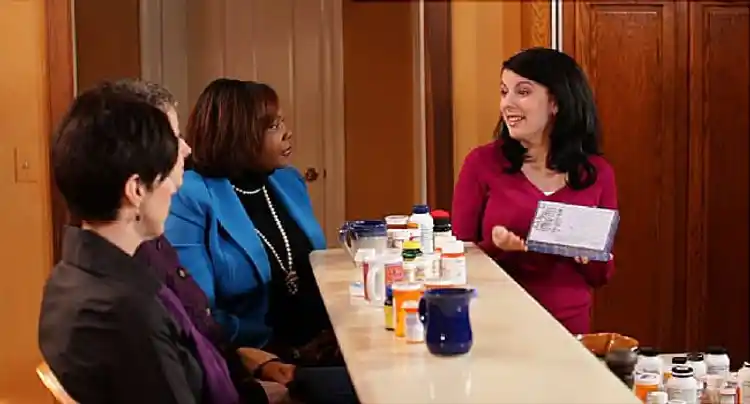Managing Lupus Meds

Hide Video Transcript
Video Transcript
CHRISTINE MISERANDO
Hey, come on in. Nice to meet you. I'm so glad you came over. Let's move over here. Oh, wow. Look who's here. Hey, girls. I just emptied my medicine cabinet, and I really think I won. I'm just saying I think that I can just start a little collection of medication. I don't know about you. Who wins? Let's see. KIM SCHOFIELD
I know. I've got a bunch here. You know I started out with 32. I'm down to about 12 now. I kind of think I'm-- CHRISTINE MISERANDO
Wait, that's good You're down to have. KIM SCHOFIELD
Got motion. CHRISTINE MISERANDO
OK. That's nice. How are you doing? STACIE COLLETT
I had about 16, except once a week I have to take about 20. NANCY BISTRITZ
I think I'm the lightweight of the group with the core meds. This does not include meds I take for side effects, but I've got about 11 pills I take every day for core. CHRISTINE MISERANDO: See, and that's what's funny. There's lupus medicine, but then there's medicine for some of these other symptoms that we get or other even secondary diseases that we get from having lupus. I kind of joke sometimes that lupus never comes to the party alone. No. Lupus brings friends. So I think it's really important to write down your medicines somewhere and to write down the dosages, the color or the shape, the size, anything to keep you organized and remember what your pills are, when you take them, because I find the more organized you are, the easier it actually is.
KIM SCHOFIELD
Every three months, I update mine, because medications change so much. You start out on one dosage. You go back, and they're switching you over to something. I can't even get to the pharmacy fast enough before you're changing a medication. NANCY BISTRITZ
I find that going to one pharmacist, especially when you are going to so many different doctors, because you can go in there and say, hey, listen. You know, this doctor prescribed me this medication. You know that I take X, Y, and Z. Can you just double check and make sure that there's no interaction? Especially when you're taking-- some of the medicines that we take are pretty hardcore medicines. CHRISTINE MISERANDO
I found that, you know, becoming best friends with my pharmacist, she has a few more minutes. She can say, oh, wait. Oh, you're feeling dizzy? You know, this might make you feel dizzy. And at least you feel like, oh, this symptom is, well, normal, but at least you know it's expected. KIM SCHOFIELD
When I first got diagnosed, and I was never a medicine person, and so I was not used to taking anything. And I ended up having to go on 32 different pills. It was hard. And one of the things I started doing was I started using my cell phone to kind of set the alarm for taking my pills every three to four hours, but the problem was I was in a meeting, and my alarms kept going off. And everybody starts looking and overwhelming like, OK, what's going on? So you don't want to draw too much attention, but at the same time, it's real. We've got to take our meds. CHRISTINE MISERANDO: I find that you can't take medicine on an empty stomach most times, or else then you'll feel nauseous or sick or whatever. And they don't work as effectively, but how do you eat? How do you fit in eating when you might be nauseous or when you might not be hungry or you might be busy?
STACIE COLLETT
Well, for me, in the morning, I have to take a couple of pills on an empty stomach. So that's good. I get up. I take my medicine. I go on about my day. The afternoon, I have to take my steroids, and we all know you cannot take that on an empty stomach. So I'll grab a quick bite, some oatmeal, or take that in the afternoon. And in the evening is when I take most of my medicine. I take like 12 at night. And if I am nauseous, I'm not feeling well, I'll try oatmeal just to get the pills down. KIM SCHOFIELD
I try to keep a lot of snacks in the house. I try to space them out and know that between three and four hours, it's time to take some more meds. And so I keep little things handy. But you know, the size of the pills are-- it's almost like you're taking a horse pill, at least some of them. STACIE COLLETT
Like I'm having another meal when you take your medicine. CHRISTINE MISERANDO
Yes. KIM SCHOFIELD
Yeah. CHRISTINE MISERANDO: And sometimes-- I don't know about you guys-- but the aftertaste. I thought I was the only one on the planet that felt like I was sucking on a penny.
KIM SCHOFIELD
Yes. CHRISTINE MISERANDO
But do you find that you have an aftertaste, a weird-- KIM SCHOFIELD: A strong, weird taste that takes awhile for you to start telling other people, listen, does anybody else taste metal around here? But as you talk to more lupus patients, you'll find that it is common when you're taking medication. So we want to be cognizant of that and also mention that to your doctor.
NANCY BISTRITZ
The pills to me are-- it's almost like a psychological thing, because it is a gentle reminder, a very subtle reminder of, you know, you've got this. You have to deal with it. CHRISTINE MISERANDO
It can be upsetting, and it can be depressing to do that every day, because it is that reminder. But I try to close my eyes and say, well, this is going to help me be better. And then if I kind of try to flip that and say, if I take this, I'm going have a better day. And I find even sometimes my friends will even laugh at dinner and go, did you take your meds? So now my friends know that it's medicine time, because it just is part of your life. And that's kind of-- STACIE COLLETT
Think of it as like a dessert. CHRISTINE MISERANDO
You know, I don't know if I could-- KIM SCHOFIELD: With an aftertaste of metal.
CHRISTINE MISERANDO
I don't know if I could do that, Stacie, but I will try. I will try. 